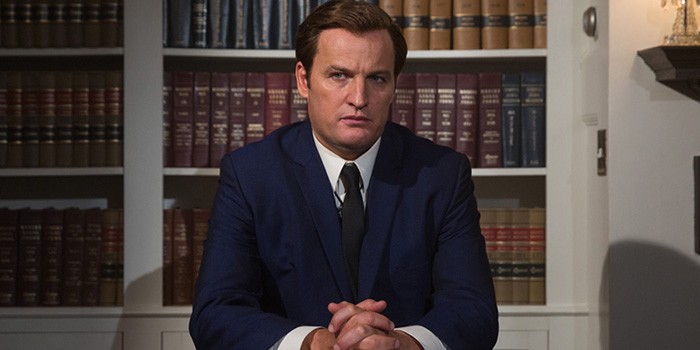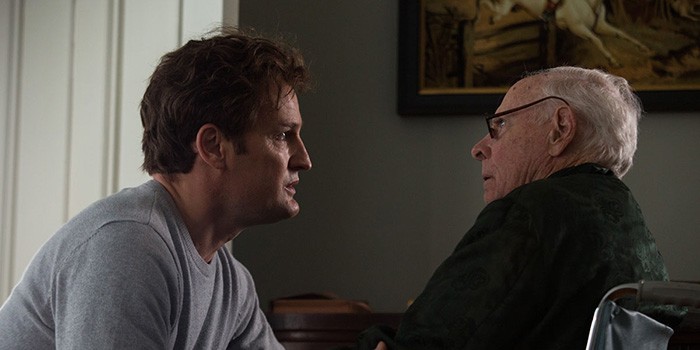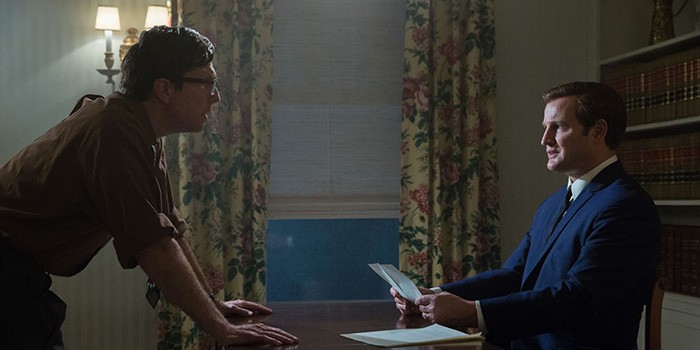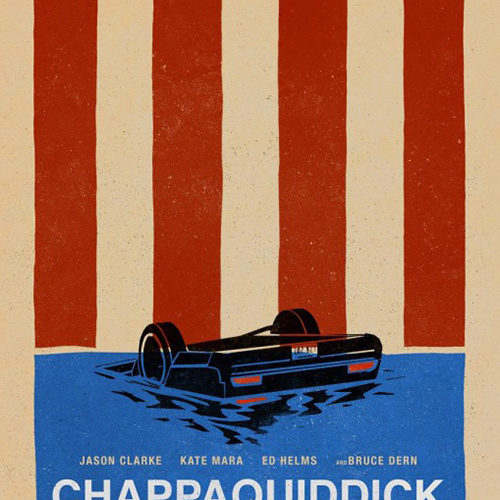It was always funny to think of Ted Kennedy as “the other Kennedy.” How could you not? Despite his long tenure as Massachusetts Senator, he wasn’t “anointed” like Jack or Bobby. He tried and failed to secure a presidential nomination, but even if he won there’d always be that one incident tainting his legacy and integrity. The place was Chappaquiddick and the reality was he killed someone. He became the butt of a joke—a tasteless joke. Nothing he’d ever do could stop people from flippantly calling him a “murderer.” It doesn’t matter that he wasn’t convicted and served no time. The albatross that was July 18, 1969 would never go away. Maybe it haunted him personally. Maybe he accepted it. That defeat, however, showed America had not.
I’m not certain if the truth ever came out about that evening’s events beyond speculation, but I don’t think anyone would question the believably authentic script that Taylor Allen and Andrew Logan wrote for Chappaquiddick. They depict that night with the melancholy and hopelessness Ted (Jason Clarke) would have felt so soon after the death of his third brother. It was a time of self-reflection rather than political aspiration, one forcing him to question how far he wanted to go. Was the Senate enough? Was he fighting for his brothers’ legacies, his father’s (Bruce Dern’s Joe Kennedy Sr) ambition, or his own desire? Add some alcohol and the faces of Bobby’s former secretaries surrounding him with optimism that he could persevere and you can imagine the dark, haunted thoughts he’d have.

So maybe Mary Jo Kopechne (Kate Mara) did approach him for a heart-to-heart about the future. She was lost after Bobby’s death too, quitting Washington to return home. Her appearance this weekend was as much to see old friends as contemplate Ted’s offer to work for him. Off they went into the night to talk. And off the bridge they’d go into the water. Ted would escape to scream her name and walk back to the cabin. He would rustle up his cousin/lawyer Joe Gargan (Ed Helms) and Massachusetts US Attorney Paul Markham (Jim Gaffigan) to help get his head straight and figure out what to do next. And while Ted would go to his hotel and fall asleep without reporting what happened, Mary Jo would suffocate alone.
This all happens in act one: a solemn series of events with dire consequences surrounding a troubled man. Director John Curran and Clarke do well digging deep into Kennedy’s psychology to show him as a sympathetic tragedy case wound too tight. We see his remorse and pain, acknowledging the voices of good (Gargan) and bad (his father) forcing him to choose between what was “right” for the family name and right for his soul. He’s painted as a man imprisoned along a path he never wanted, torn between the identity he hoped to embrace and one thrust upon him. And we almost do feel sorry—but not for the reasons you may think. We don’t wonder whether he did nothing wrong. We wonder if he understands he did.

This probably sounds weird because it is. Whether a product of the script as written or of Curran’s directorial decisions, the second half of Chappaquiddick plays like comedy. The filmmakers understand that we come into it thinking about how privilege and celebrity helped Kennedy retain his innocence in the eyes of the law. As such they don’t try and hide a version of the truth we already accept: that Ted’s negligence killed Kopechne. Rather than move forward on that trajectory—forcing us to despise him as a sociopathic maniac who feels nothing—Curran turns Kennedy into a child. He makes him impetuous, contradictory, and erratic. He makes him into the caricature so many believe. This Ted Kennedy could hardly tie his shoes let alone maliciously orchestrate a cover-up.
This is why the story is so sad. Ted’s desperate to do right by Mary Jo. He’s haunted by the knowledge of what he did and the tragic fact it can be his escape. Her death could let him leave politics in a manner that didn’t diminish his work. It would be a personal event that ruined him rather than cowardice in not running or defeat if he did. Ted could be remembered for his integrity as the one who didn’t buy his way out of a deserving situation. Gargan was on his side—his own conscience assuaged by Ted telling the truth. But his voice and Kennedy’s own wasn’t enough to combat his name’s clout. What follows is therefore a laugh out loud comedy of idiotic errors.

Casting Helms and Gaffigan is therefore intentional as the timing of their incredulous reactions to things Clarke’s Kennedy does are crucial and hilarious. Add the harsh dramatics from Clancy Brown and Taylor Nichols as the fixers Joe Sr. hired to sweep everything under the rug and you get a group of straight men to stare back in stunned silence at the latest mistake. Ted is literally making things worse with every step forward that he takes. Maybe he’s self-destructing or perhaps he’s simply looking to prove to his father that he isn’t the punch line everyone believes—either way he digs his hole deeper. He makes it so the only option left is to pray Massachusetts loves what “Kennedy” stands for enough to keep him employed.
It’s strange watching Clarke as the doof. This isn’t to say he plays Ted over-the-top in any way, just that his character puts himself in stupid situations for which he must than deliver a matter-of-fact admission of wrongdoing as though it’s an “oops” situation and not a “you’re going to jail” one. He retains a powerful sense of emotional turmoil behind those actions too, though, earning our empathy right up until his final decision. You almost can’t blame him for who he ultimately chooses to listen to—Gargan or his father—when everyone else props him up as the last hope of a family he never quite fit. Look no further than Olivia Thirlby’s character’s reaction to Mary Jo’s death to know why Ted never saw a cell.
Chappaquiddick premiered at the Toronto International Film Festival and opens on April 6.

